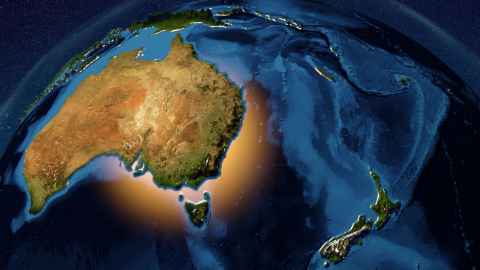New Zealand and Australia: trade ties that bind
15 February 2023
The trans-Tasman trade relationship is the focus of this year's Auckland Trade and Economic Policy School on 23 and 24 February at the University of Auckland.

Although we love to beat each other in sport, New Zealand’s connection with Australia is vital, especially in relation to trade policy and closer economic relations.
The trans-Tasman relationship and both countries’ engagement with the broader Asia Pacific region is the focus of this year’s Auckland Trade and Economic Policy School (ATEPS) at the University of Auckland, which is now open for registration.
Trans-Tasman, Regional and Global Initiatives for Sustainable Trade Futures will be hosted by the Public Policy Institute as an in-person-only event on 23 and 24 February at the University’s Fale Pasifika.
Public Policy Institute director, Professor Jennifer Curtin, says the fact that Prime Minister Chris Hipkins wasted no time in meeting with Australian Prime Minister Anthony Albanese highlights the importance of the relationship to New Zealand.
“Australia has a long history of being one of our major trading partners, and we continue to share policy interests in a number of areas, including advancing multilateralism, maintaining the rules-based trading system, and making progress on newer trade-related issues like e-commerce, sustainable trade and developments in Indigenous trade, including Indigenous procurement.”
She says the PM’s visit marked the start of a significant year for New Zealand and Australia, including the 40th anniversary of the Closer Economic Relations Agreement (CER), 50 years of the Trans-Tasman Travel Arrangement, and 80 years since the establishment of the two high commissions.
“The bilateral relationship is often seen as asymmetrical, but there is a recognition on both sides that strong people-to-people connections matter for business, policy, and for regional stability.”
Conversations on key issues will continue when Prime Minister Hipkins hosts Prime Minister Albanese in Wellington in mid-July, coinciding with the next Australia New Zealand Leadership Forum meeting.
New Zealand is also hosting the Comprehensive and Progressive Agreement for Trans-Pacific Partnership (CPTPP) Commission in July this year, and Professor Curtin says Minister for Trade and Export Growth Damien O’Connor has labelled this event as a significant opportunity for New Zealand to showcase itself as part of the growing Asia, Pacific and Latin America trading bloc.

The Auckland Trade and Economic Policy School 2023
Trans-Tasman, Regional and Global Initiatives for Sustainable Trade Futures will feature a number of high-profile international speakers including Deborah Elms, founder of the Asian Trade Centre in Singapore (sponsored by Latin America Centre of Asia-Pacific Excellence) and Allan Gyngell (national president of the Australian Institute of International Affairs).
Also speaking will be Dr Shiro Armstrong (Australian National University, Crawford School of Public Policy); Kristen Bondietti (Australian APEC Centre); Michelle Deshong (SupplyNation Australia) and Deputy High Commissioner for Australia Amy Guihot.
They are joined by a raft of academic, business, and civil society trade experts from Aotearoa New Zealand, including Siosaia Mataele (Microsoft); Jason Mika (University of Waikato); Moana Maniapoto (Ngā Toki Whakarururanga); Adrian Collier (TradeWindow); Greg Lowe (Australia New Zealand Leadership Forum and Beca); Stephanie Honey (Honey Consulting); Glynis Miller (Pacific Trade and Invest) and Malcolm Johns, who is joining Genesis Energy as CEO in March.
The bilateral relationship is often seen as asymmetrical, but there is a recognition on both sides that strong people-to-people connections matter for business, policy, and for regional stability.
The two-day event will provide further insights into the importance of the highly connected economic and trade eco-system that has developed in East Asia, with China as one of its central nodes, says trade policy expert Associate Professor Rob Scollay.
He says maintaining and deepening ties with East Asia is an interest that New Zealand shares with Australia, and one toward which the approaches of the two governments have recently shown signs of increasing convergence.
“Australia and New Zealand have each underlined their commitment to deepening integration with East Asia by joining with 13 East Asian countries in the Regional Comprehensive Economic Partnership (RCEP).”
RCEP is now the world’s largest free trade agreement, meaning New Zealand’s economic prosperity is intimately connected with prosperity of East Asia, says Dr Scollay. However, the CPTPP remains an important, and growing agreement, with Chile, Peru and Mexico already members and Costa Rica and Ecuador seeking to join.
The ATEPS event will feature panels on sustainable, digital and Indigenous trade as well as the green economy, and the future of trans-Tasman, global and regional trade agreements.
”It will be a valuable opportunity for delegates to discuss how to strengthen the CER Agreement and Single Economic Market agenda to ensure they continue to deliver benefits to business on both sides of the Tasman,” says Professor Curtin.
The Auckland Trade and Economic Policy School receives support from the Ministry for Foreign Affairs and Trade and Latin America Centre of Asia-Pacific Excellence.
Media contact
Julianne Evans | Media adviser
M: 027 562 5868
E: julianne.evans@auckland.ac.nz